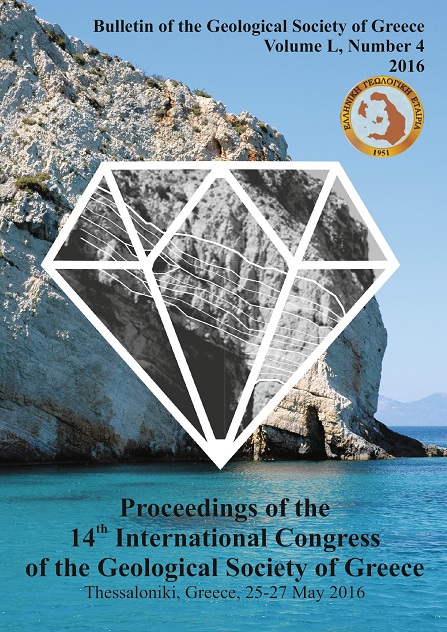ASSESSMENT ON HYDROTHERMAL PARTICLE CHEMISTRY FROM A SHALLOW VENTING SYSTEM OFFSHORE KOS, AEGEAN SEA
Résumé
Shallow submarine hydrothermal vents along Hellenic Volcanic Arc transfer significant quantities of particles enriched in basic metals. Fluids collected by scuba diving from two shallow hydrothermal venting areas on Kos Island in the Aegean Sea in East Mediterranean. Samples were filtrated and membrane filters leached with a mixture of acids. Chemical analysis performed in suspended particles for Fe, Mn, Cu, Pb, Cd, Ca, Ba, Sr, Li, Al and Si. The suspended particulate matter (SPM) flux varied from 0.93 to 8.64 mg/l and between 0.21 and 20.94 mg/l in two sites. Metal/Al ratios also vary significantly within a short distance. The pH of hydrothermal waters was from 5.50 to 5.95 in Kephalos Bay and from 6.09 to 6.53 in Bros Thermi suggesting gases CO2 and H2S may control pH values. Particles were dominated by Fe, Ca, Si and Al and strongly enriched in Mn, Cu, Pb and Ba. Three geochemical groups were identified being associated with distinct hydrothermal processes concerning sulphide minerals, carbonate substrate and deeper Al-Silicate rock basement
Article Details
- Comment citer
-
Megalovasilis, P. (2016). ASSESSMENT ON HYDROTHERMAL PARTICLE CHEMISTRY FROM A SHALLOW VENTING SYSTEM OFFSHORE KOS, AEGEAN SEA. Bulletin of the Geological Society of Greece, 50(4), 1933–1942. https://doi.org/10.12681/bgsg.14243
- Rubrique
- Petrology and Mineralogy

Ce travail est disponible sous licence Creative Commons Attribution - Pas d’Utilisation Commerciale 4.0 International.
Authors who publish with this journal agree to the following terms:
Authors retain copyright and grant the journal right of first publication with the work simultaneously licensed under a Creative Commons Attribution Non-Commercial License that allows others to share the work with an acknowledgement of the work's authorship and initial publication in this journal.
Authors are able to enter into separate, additional contractual arrangements for the non-exclusive distribution of the journal's published version of the work (e.g. post it to an institutional repository or publish it in a book), with an acknowledgement of its initial publication in this journal. Authors are permitted and encouraged to post their work online (preferably in institutional repositories or on their website) prior to and during the submission process, as it can lead to productive exchanges, as well as earlier and greater citation of published work.



